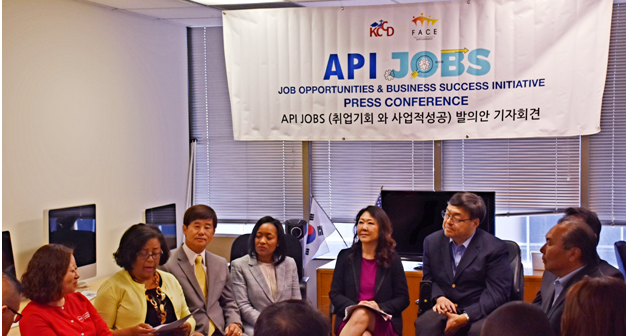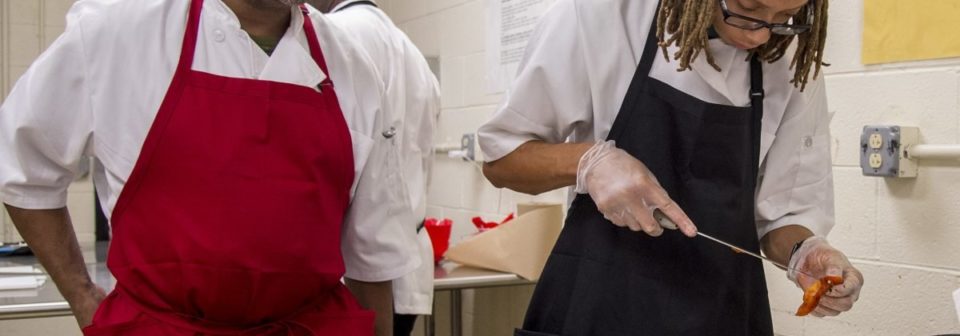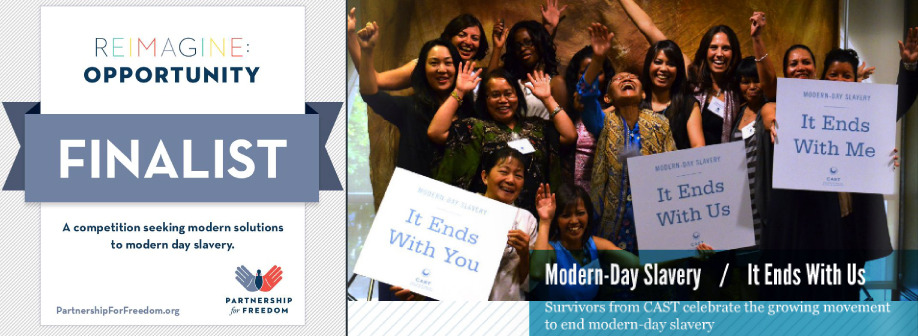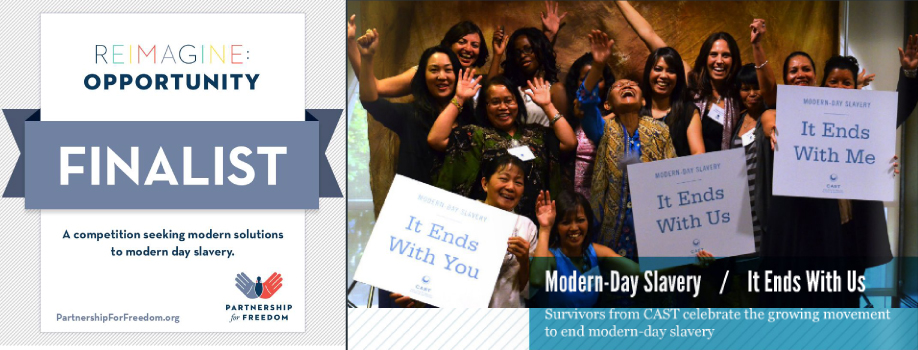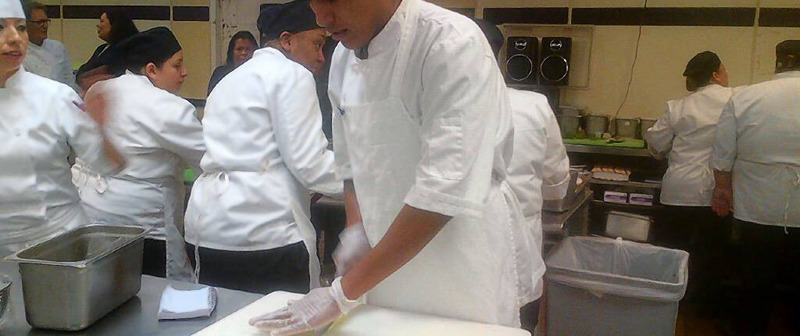HTA
Mario Edwards, a 30-year-old, African American man who lives in Lynwood with his wife and 3 young children (ages 12, 6 and 1), is dedicated to his family and doing whatever he needs to provide for them. A native of Los Angeles and a true survivor himself, Mario knows firsthand the importance of family having overcome a number of struggles early in life, including being shot multiple times while in his senior year at Dorsey High School. Pulling through, Mario resumed school at Los Angeles’ View Park High School, where he graduated and then shortly thereafter welcomed his first daughter into the world.
With a growing family to care for and determined to do all he could to provide, Mario worked for a number of years in a warehouse as a shipping and receiving clerk. He also did some housekeeping work to help make ends meet. So, when Mario’s Grandmother shared with him a flyer she had received from church with information about the Hospitality Training Academy (HTA) and a new U.S. Department of Labor Room Attendant/Housekeeping Apprenticeship Program they were launching, he decided to go check it out. (more…)
Read More
FACE Announces Free Training and Hiring Opportunities in Hospitality, Transportation, and Civil Service through API JOBS (Job Opportunities & Business Success) Initiative in Partnership with HTA, LA Metro, and the City of Los Angeles
Los Angeles, CA – On Thursday, April 12, 2018, Faith and Community Empowerment (FACE), in partnership with Hospitality Training Academy (HTA), LA Metro, and the City of Los Angeles hosted a press conference to announce several employment and training opportunities as part of FACES’s API JOBS (Jobs Opportunities & Business Success) Initiative. (more…)
Read More
Business— Labor and Unions
Here’s the story of how a union helped a company
Updated: AUGUST 18, 2017 — 2:56 PM EDT
Damon Roundtree, 18, carefully removed charred skin from a roasted red pepper, slicing it into narrow strips.
That one simple act had ramifications well beyond embellishing a sandwich, which looked delicious: job readiness; opportunities for underemployed city minorities; union growth; union relevance; schools serving communities; employer savings on training; plus a crew of cooks, servers, bartenders, and dishwashers ready to work at a new Philadelphia International Airport restaurant.
Lots loaded onto that sandwich.
“To me, it’s a new start,” Roundtree said this week. As a teenager, he got into trouble. As a young father-to-be, he wants a career built on his passion for cooking. “It’s fun. It tastes good, and it keeps me occupied.”
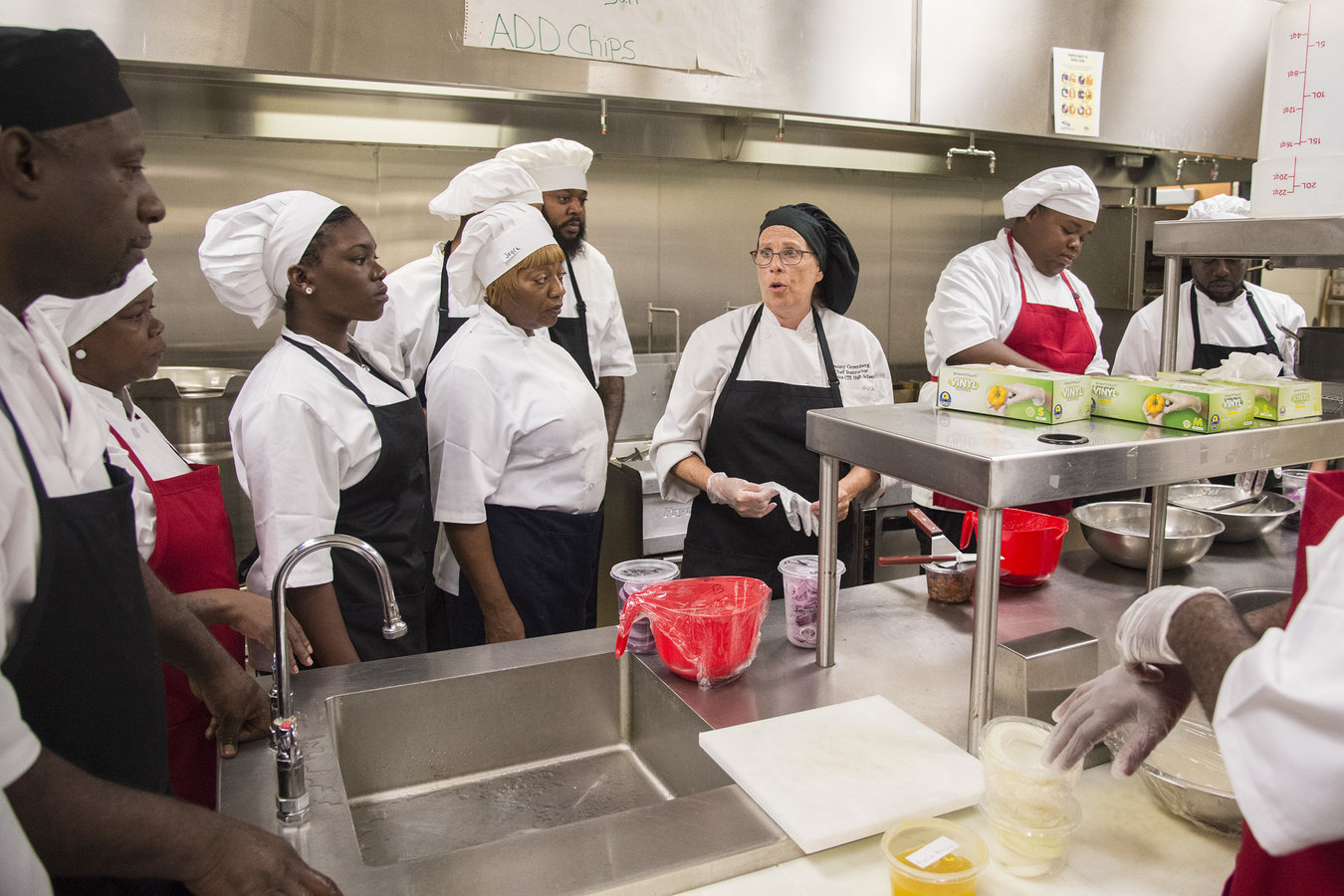
CLEM MURRAY / STAFF PHOTOGRAPHER
Wearing a black cap, Penny Greenberg, 62, the head of the culinary program at Dobbins Career and Technical Education High School, conducts a training program sponsored by hospitality union Unite Here as students gather around the stove.
On Tuesday, 75 graduates of the first class of the Unite Here Philadelphia Hospitality Academy will be honored at City Hall. Students range in age and capability from recent high school graduates such as Roundtree, a novice, to longtime chef and manager Anthony Cunningham, 53, who was laid off from his job at a Japanese restaurant in June.
“I’ve put in resumes, but I can’t afford to wait for a vacancy,” Cunningham said.
Read More
HTA proudly announces that CAST, the Coalition to Abolish Slavery & Trafficking, selected as
Finalist in the Partnership for Freedom Challenge
LOS ANGELES, California, December 17, 2013 –The Hospitality Training Academy (HTA) is thrilled to announce that the Coalition to Abolish Slavery & Trafficking (CAST), has been selected as a finalist in the Reimagine: Opportunity, a national competition seeking innovative ideas to improve the lives of survivors of modern-day slavery in the United States. The HTA is a funded partner in this grant proposal.
Reimagine: Opportunity is sponsored by the Partnership for Freedom, a public-private partnership led by Humanity United, the U.S. Department of Justice, the U.S. Department of Health and Human Services, the U.S. Department of Housing and Urban Development, Goldman Sachs 10,000 Women initiative and Steven Spielberg’s Righteous Persons Foundation.
CAST’s initiative, The Networked Survivor, is a plan for creating powerful professional and social networks resulting in career opportunities for survivors of human trafficking in some of Los Angeles’ largest industries: tourism, hospitality, entertainment, beauty and health. CAST’s idea was selected from among more than 160 submissions representing 260 applying organizations from around the country.
In January, CAST, the HTA and other partners will join 12 other finalists at an Innovation Workshop in Washington, DC, where specialists in technology, social enterprise, communications and media will meet with us. In the spring, the winners will be announced, with prize grants totaling $1.8 million.
CAST Executive Director and CEO Kay Buck says, “Survivors of human trafficking are some of the most entrepreneurial and hard-working people I know. However, because of a variety of complex factors, they are often held back from moving forward in achieving their education and career goals. Celebrating its 15th year serving survivors, CAST is boldly stepping into its next era as a catalyst of collective impact and shared leadership with new players who bring diverse expertise, resources and economic opportunities for survivors to the table. “
With survivors as our advisors, CAST has joined forces with Hospitality Training Academy (the Taft-Hartley Funded training arm of the UNITE HERE Local 11 Labor Union in Los Angeles’ high-growth tourism and hospitality industry), Paul Mitchell Schools and UEvolution to provide quality training and sustainable career opportunities that lead to economic empowerment.”
HTA Executive Director Adine Forman shares, “CAST gathered its most diverse, creative and networked partners to envision how we can collectively transform economic opportunities for survivors. There are abundant opportunities, but there currently exists a lack of networks and connections preventing survivors from accessing them. With the HTA, we can work to pipeline CAST clients into secure, living wage union jobs with career advancement opportunities into the hospitality/tourism/food service sector.”
ABOUT HTA
The Hospitality Training Academy (HTA) provides training for new hires or current/incumbent workers looking for promotions through improved job skills and work experience. The HTA is designed to improve Los Angeles’ tourism and hospitality industry by increasing the skill level of its workforce. The HTA provides courses specifically tailored to increase workers’ skills in a variety of areas, including culinary/cook, server, dishwasher, busser, bartender, barista, housekeeping, host/hostess, cashier, retail sales/customer service and Vocational English as a Second Language (VESL). For more information, please visit our website at www.lahta.org.
About CAST
For over 15 years, CAST has championed a comprehensive, survivor-centered approach to combatting human trafficking. CAST provides trafficking survivors with a continuum of life-transforming services: a 24-hour emergency response system; legal services; social services; and a survivor leadership program. Through this intensive work in the trenches, CAST holds a unique perspective that has catalyzed innovative partnerships. With these strategic relationships in place, CAST is boldly stepping into its next era as an agent of shared leadership and collective impact with new players to unveil The Networked Survivor, a plan for creating powerful career paths and networks for survivors of human trafficking. For more information, please visit: www.castla.org.
About Partnership for Freedom
The Partnership for Freedom is a public-private partnership that was first announced by President Obama during his landmark speech on human trafficking in September 2012. It is led by Humanity United, a foundation dedicated to building peace and advancing human freedom, and the U.S. Department of Justice, the U.S. Department of Health and Human Services (HHS), the U.S. Department of Housing and Urban Development, Goldman Sachs10,000 Women initiative and Steven Spielberg’s Righteous Persons Foundation.
For More Information:
Jeremy Broekman
BROEKMAN communications
818-212-9201
Read More
WIB Hospitality Initiative Retrains Displaced Workers in LAX’s New High End Culinary Model
https://www.wiblacity.org/component/content/article/1-wib-articles/109-unitehere-hta-lax.html

The City of Los Angeles has identified the hospitality industry as a high-growth sector. In fact, in 2009, tourism surpassed international trade as the number-one job generator in LA County. The Mayor’s office demonstrated its commitment to keep this high-demand industry thriving through its grant award to the Labor-Management Partnership in hospitality. Improved guest service means occupancy rates go up and hotels generate repeat business.
Eric Rendon was displaced from his cashier’s job at Ruby’s by the modernization underway at LAX, but he is retraining as a high-end chef (photo courtesy of Los Angeles Times/December 3, 2012)
This year the City has invested $225,000 for a pilot program re-training 50 displaced airport food industry workers for employment in new L.A. signature culinary eateries opening within the Los Angeles World Airport (LAX). These culinary students are currently training with world class chefs. All trainees who successfully complete the program are expected to be hired at various airport restaurants as the Tom Bradley International and Terminal 4 reopen.
An in-depth L.A. Times article about the new airport restaurants and more information about the HTA are available at:
www.latimes.com (local news section)
www.unitehere11.org (hospitality training academy)
Copyright © 2013 Workforce Investment Board. All rights reserved
The City of Los Angeles Workforce Investment Board is a WIA Title I financially assisted program or activity and is an equal opportunity employer/program. Auxiliary aids and services are available upon request to individuals with disabilities.
Read More

A good meal at LAX is no longer a flight of fancy
For years, the airport was a culinary wasteland. But signature restaurants are preparing to offer fare to travelers that is worthy of L.A.
December 06, 2012 | By Gale Holland, Los Angeles Times
https://articles.latimes.com/2012/dec/06/local/la-me-holland-burgerflipper-20121207

Eric Rendon, 19, of Inglewood was displaced from his cashier’s job at Ruby’s by the modernization underway at LAX, but he is retraining as a high-end chef.
Airport food in L.A. has been so bad for so long it’s no longer brought up in polite society. Only at LAX could the 2010 arrival of Pink’s hot dogs — and God love ’em, I know I do — have been welcomed like Moses coming down off the mountain.
“It’s like the smog: Why complain? Everybody knows,” chef Mark Peel told me last week.
Since we began having to schlep wretched little bags of food on the plane or starve, the smell of rancid oil and Flamin’ Hot Cheetos has made the LAX experience unpleasant in all five senses. But all that is about to change.
LAX is opening its doors starting this year to some of the city’s signature restaurants, including Larder at Tavern, Cole’s and Ford’s Filling Station. A rotating cast of food-truck vendors including Kogi’s is expected to operate out of a space with a mock truck decor. Peel, who closed Campanile on La Brea Avenue in the fall after 23 years, is opening an airport version of the high-class restaurant. The lucky terminals include Tom Bradley International and Terminal 4, home to American Airlines.
What makes this of interest outside foodie circles is that, unlike other gentrification schemes, it will not cost all the little people their jobs. The city, through the Unite Here Local 11 union, is spending $250,000 to retrain workers displaced from eateries like Burger King and Chili’s to work in the new culinary palaces.
Last week, I took a turn through the clattering kitchen where the training has been underway since October. The kitchen, along with a cafeteria, is on the ground floor, beneath the struts that thrust the flying-saucer themed restaurant Encounter into the air above LAX.
Inside, 52 cooks from South Los Angeles, Carson, Inglewood and other airport-adjacent neighborhoods were practicing haute cuisine. Workers in white toques and chef jackets grated lemon zest, snipped herbs and squeezed potato croquettes out of pastry tubes. Plates of egg rolls with dipping sauce, salmon with field greens or carnitas with salsa fresca were passed around. Peel, who has appeared on “Top Chef” and “Top Chef Masters,” dropped by to give an inspirational speech.
“This is where we’re trying to give people a much better first impression of LA, and you’re it,” he said.
Leanna Billman told me the closest she got to cooking on the Burger King fry line was flipping frozen chicken strips on the grill. Now she’s learning to braise meat, shuck oysters and slice vegetables in fancy cuts like paysanne and rondelle.
“I grew up kind of in poverty,” said the South Los Angeles resident. “Now I’m in an actual kitchen instead of behind a sandwich grill. It’s great.”
Janette Perez, 21, a former Ruby’s server, grew up in Inglewood on Mexican food, french fries and chicken, but learned to make Caesar salad dressing with anchovies for her family.
“I didn’t know they were fish, ” Perez said. “These talents I thought I didn’t have are really coming out.”
Former Ruby’s cashier Eric Rendon rides the bus in from Inglewood, dressed in his chef’s whites. His fellow riders treat him with new respect, he said.
“My family is really proud of me,” said Rendon, 19.
Peel’s speech to the cooks covered how once-fertile African land became the Sahara Desert because of unsustainable farming practices. It went over some of their heads.
“Sustainability, sustainability,” Perez repeated afterward, stumped. But she is excited about cooking healthier. “We’re not eating enough fresh food,” she said. “Everything we eat is fattening.”
Peel said a modern kitchen staff should understand the importance of sustainability along with more traditional culinary skills. Peel’s first culinary job was fry cook at Cindy’s, “where the 605 meets the Pomona Freeway,” Peel said. “Everybody’s got to start somewhere.”
The LAX Campanile will have sit-down dining as well as takeout, Peel told a small group gathered around one of the prep tables, prompting a teaching chef from Los Angeles Trade Technical College to joke he’d have to find a way around security so he could eat there. But passengers on average have only 12 minutes to get in and out of the terminal.
Peel said he could still serve high-end dishes like ribeye with stewed beans through innovations like sous-vide, in which plastic-wrapped food cooks slowly in a water bath. As an example, Peel said he would marinate and brine a double-thick pork chop, put it in the bath, then when an order came in, throw it over a wood fire or grill to give it a char. The chop could be out in four minutes, he said.
This kind of food is not going to come cheap. The retrained workers will command better wages, and more staff will be needed in the kitchen; a spokeswoman said the union expects its membership to double.
Rest assured, LAX will always have its burgers with fries.
“There’s always going to be a place for fast food,” Peel said. “But we have an opportunity for much greater diversity…. The way we’re going to do that is with a highly trained, motivated and intelligent work force.”
Valencia Crain, 49, has run the gamut of food service jobs, starting out on the production line at a fish processing plant in Los Angeles. She cut fish and passed them through batter, monitoring the viscosity meter to make sure it wasn’t too watery.
Later, she worked at the airport LA Roadhouse Route 66, where much of the cooking consisted of microwaving. Now, she’s learned how to prepare a dashi base and clear broth for Japanese soup, and clam chowder from scratch, which she put to the ultimate test: her son, Samej. The 16-year-old is part of the fiercest fast-food fan demographic on earth: the L.A. teenager.
The soup more than passed.
“When he tasted mine he said, ‘Mom, yours is the best in the world,'” Crain said.
Read More







